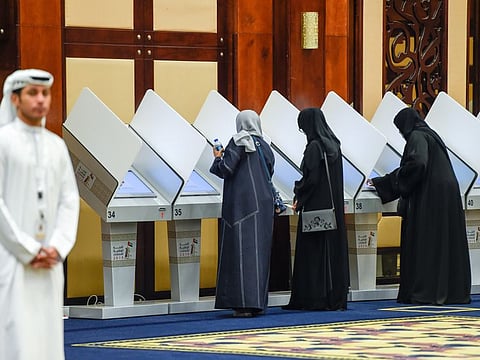UAE: 2019 FNC elections saw highest ever number of voters
National Election Committee issues Elections Report

Abu Dhabi: The 2019 Federal National Council (FNC) elections witnessed the largest number of voters in the history of FNC elections, with the electoral college including 337,738 members compared to 224,281 members in 2015.
Emirati women were also strongly represented in the 2019 elections, making up 50.62 per cent of the electoral lists, whereas men accounted for 49.38 per cent.
These milestones were detailed in Federal National Council (FNC) Elections Report 2019, issued by the National Election Committee (NEC). The report offers comprehensive information covering every stage of the 2019 elections, including technical and administrative aspects, awareness and education activities, and holistic training programmes for staff of all specialities.
“The National Election Committee is committed to issuing this report after every elections. It offers evidence of the success of the UAE’s electoral process, embodying the significant progress made in promoting a culture of political participation among Emiratis and their enthusiasm to contribute to the UAE’s parliamentary model,” said Abdulrahman Al Owais, UAE Minister of Health and Prevention, Minister of State for FNC Affairs, and NEC Chairman.
“The report systematically documents the successes and accomplishments made during the 2019 elections. It provides a comprehensive look at all stages of the electoral process, quantifying them with numbers, facts, and evidence that highlight the maturity of parliamentary life in the UAE. It also underlines the level of public awareness of the importance of the Federal National Council and the role that its members play in enhancing the performance of key sectors across the country,” Al Owais added.
According to the report, the 2019 elections witnessed a remarkable involvement from young people, where people aged 21 to 40 made up 61.32 per cent of electoral college lists, 30.04 per cent of whom were aged 21 to 30, while the remaining 31.28 per cent were 31 to 40 years old. This paved the way for young Emiratis to participate in large numbers in the elections, which covered all regions of the UAE.
High level of satisfaction
There was also a 48.5 per cent increase in the number of voters who cast their ballots, compared with the previous elections cycle. A remarkable 95 per cent of voters and candidates reported a high level of satisfaction with electoral procedures, which saw 1,170 employees recruited to operate polling centres, while 725 journalists and reporters worked to cover electoral activities.
The total number of ballots cast in the UAE amounted to 117,592, representing 34.81 per cent of the total number of electoral colleges members. Moreover, the number of votes cast at the UAE’s embassies and diplomatic missions notably increased by over 25 per cent from 2015, where 1,849 Emiratis voted from abroad, up from 1,378 voters in the third FNC elections cycle in 2015.
Voter turnout in the 2019 elections varied between 21 per cent and 56 per cent, the report indicated, where the emirate of Umm Al Quwain recorded the highest participation rate of 56 per cent. Furthermore, the data went on to show that awareness of the importance of participating in political life hit 92.8 per cent among targeted segments.
A total of 4,553 employees and volunteers worked to organise the elections, which also enlisted 339 technical supervisors.
The highest proportion of voters cast their ballots at 5PM amounting to 16,623 votes, whereas the lowest turnout was recorded at 8:00AM, totalling 2,375 voters. Men accounted for 59 per cent of all votes, while women made up the remaining 41 per cent. The largest recorded turnout of female voters was 43.8 per cent in Umm Al Quwain; meanwhile the largest turnout among men was 64.53 per cent in Ajman.
From an organisational aspect, the findings of the report indicated that the National Election Committee’s administration of the fourth FNC elections was successful. Voters were welcomed in all 39 polling centres, where 1,170 volunteers in administrative and organisational functions were recruited to guide voters, instruct them on the use of the electronic voting devices, and answer their questions. All Electoral Committees worked to implement the action plan to process voter activities at the polling centres, reducing the time necessary for every voter to cast their ballot to just three minutes.
The report also features the total number of voters recorded in each emirate, where Abu Dhabi led the way with 35,790 votes cast, while Dubai reported 12,891 and Sharjah had 22,451. Meanwhile, Ajman reported processing 4,393 votes, whereas Umm Al Quwain processed 3,778, Ras Al Khaimah had 22,172, and Fujairah 16,117.
The five polling centres with the highest turnout were Abu Dhabi National Exhibition Centre (ADNEC), RAK Exhibition Centre, Al Ain Convention Centre – Al Khabisi, Fujairah Exhibition Centre, and Sharjah Cultural and Chess Club. These centres alone accounted for 48 per cent of the total number of votes cast.
The report’s various chapters also include, first and foremost, the results of the FNC elections, along with important statistics. The legislation chapter, meanwhile, highlights the mechanism adopted to implement Presidential Resolution No. (1) of 2019 to increase women’s representation in the Council to 50 per cent, issued by UAE President His Highness Sheikh Khalifa bin Zayed Al Nahyan. The report also contains a chapter on the organisation, operation, and preparation of all stages of the electoral process, from polling to counting and announcing the results.
Sign up for the Daily Briefing
Get the latest news and updates straight to your inbox







